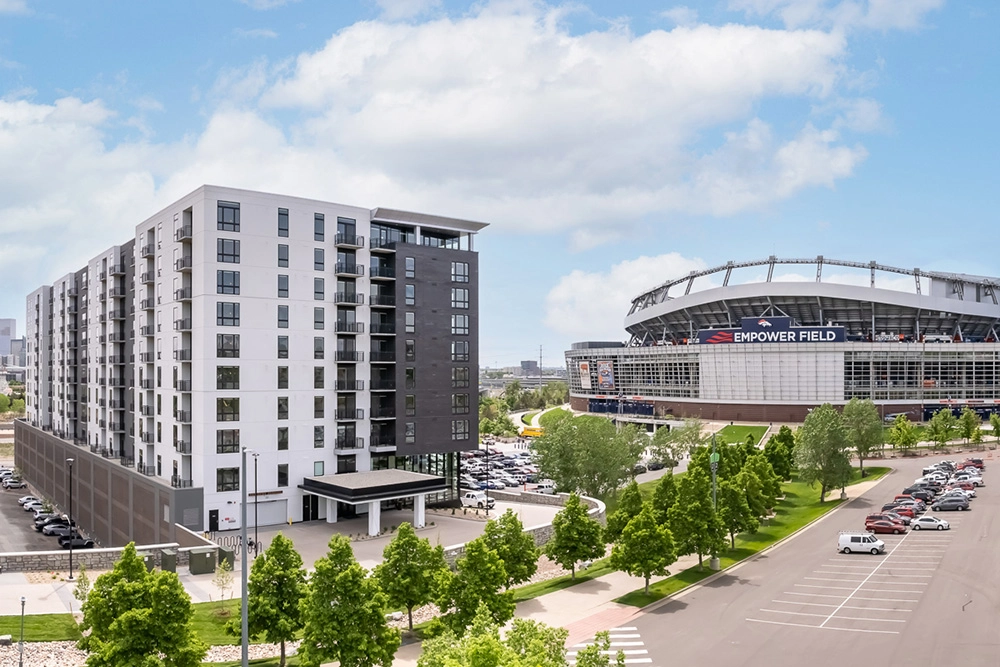19Nineteen Mile High Apartments: Achieving LEED & Fitwel Certifications in the Nick of Time
Starting construction right at the beginning of the pandemic, the team had to remain flexible to deliver 19Nineteen Mile High Apartments in Denver. That flexibility became key to meeting certification requirements added after the start.

The Project: 19Nineteen Mile High
Completed by Opus in spring 2022, 19Nineteen Mile Highis a 12-story multifamily community near Empower Field in Denver. Just 10 months after opening, the 277-unit building was already more than 76% leased. It offers studio, one-bedroom and two-bedroom units. Residents can take in exceptional views of downtown Denver and the front range while enjoying the top-of-market amenities that are desired by health-conscious and prominent young professionals attracted to the area.
The Challenge
The project launched in 2020 on the day the World Health Organization declared a global pandemic. The day before Opus closed on the deal, the Dow had one of the largest point losses in history. Then Denver issued a stay-at-home order, the City offices closed and new safety protocols were established. With disruption after disruption, it was no small feat to get the project underway let alone bring it to completion.
The Opus team knew that if there were any delays, the project might not restart.
With the project well underway and the designs in the final stages, a decision was made to pursue LEED and Fitwel certifications. Primarily driven by their capital partner, Principal Real Estate Investors, it required Opus to pivot sharply despite already raging pandemic headwinds.
“Responsible investing is important to our capital partners, and ESG requirements are becoming more common," said Joe Swensson, Director of Real Estate Development. “The benefits of sustainable buildings are also important to prospective residents when choosing a place to live. That's especially true in Denver, as many people move here to live a healthy lifestyle near the mountains."
LEED certification is a globally recognized symbol of sustainable achievement for healthy, efficient carbon- and cost-saving green buildings. It focuses on the building's infrastructure and mechanical systems. Fitwel is more program-based, centered on resident well-being and healthy living such as smoke and tobacco-free buildings, promoting stair use over elevators and emergency preparedness.
“LEED was more challenging to implement that late in the project," said Jaymes Kralicek, Project Executive. “In addition to the project timeline, it had the potential to adversely impact the budget. We had completed almost the full design along with a detailed estimate and budget. And then, a week before signing the contract, we were asked to provide an alternate for LEED certification."
“While we don't pursue LEED on every project, we typically design buildings that get very close on their own accord," said Jay Fourniea, Director of Architecture. “It's a best practice for us, so while the timing of the change was challenging, it was not insurmountable. It came down to balancing the cost impacts of the various certification enhancements with the budget and making sure we didn't overextend."
The Solution
The project team was able to cost effectively expedite the project due to Opus' integrated model that uses in-house development, construction and project management, architecture, structural engineering and interior design experts.
“Our design team can be actively drawing while we're under construction," said Jay. “Everyone works closely together throughout the life of the project. That's much more efficient than the design-bid-build model where firms have to reach out to a separate architect or contractor or both. We can easily stay in contact with each other at all stages of the project."
“As a team, we identified on the LEED scorecard what credits were most attainable or already attained, then determined what it would take to get there, how it affected the budget and how we'd cover it. And then we got it done. This is unique to Opus – it's a competitive advantage for sure. We have all the pieces in place for swift execution," Jay continued.
The Result
The Opus team achieved both LEED and Fitwel certifications while delivering the 19Nineteen Mile High project on time and on budget.
Some of the sustainable features that contributed to LEED certification on the project are green roofs and cool roof materials, enhanced air filtration and operable windows, low flow plumbing fixtures, HVAC systems that are 5% above energy efficiency codes and 100% LED lighting throughout the building.
For Fitwel certification, the development has a Walk Score above 90 points and two bikes for sharing and the entire grounds and building are tobacco and smoke-free. The building is ADA Accessible and features acoustic-control measures to decrease interior noises and bottle refilling stations to reduce plastic waste.
“We persevered despite the effects of the pandemic and then late in the game, successfully achieved LEED and Fitwel certifications," said Joe. “19Nineteen Mile High really showcases how projects benefit from Opus' collaborative approach and how it differs from traditional design-bid-build."
Article Type: Case Study
Topics: Denver | Multifamily Development & Construction | Projects | Sustainability


